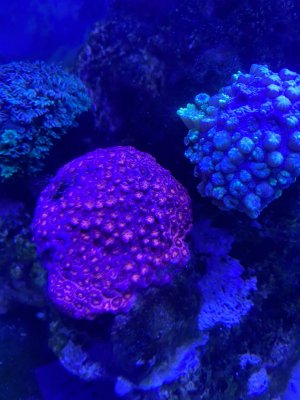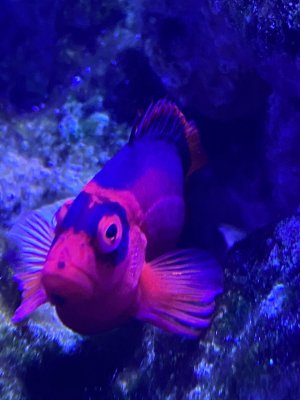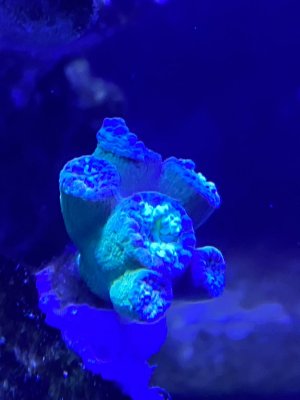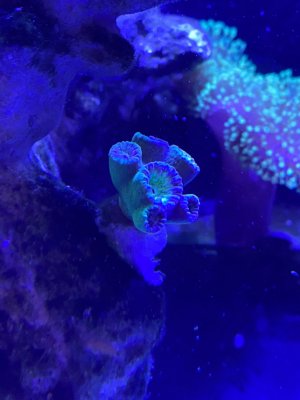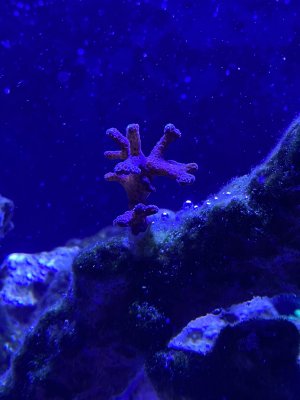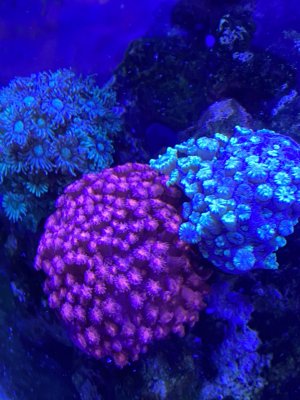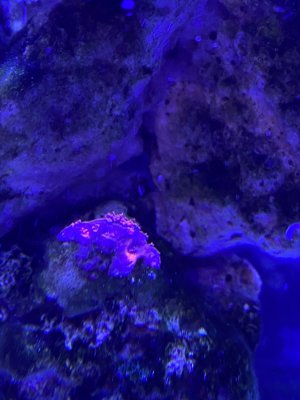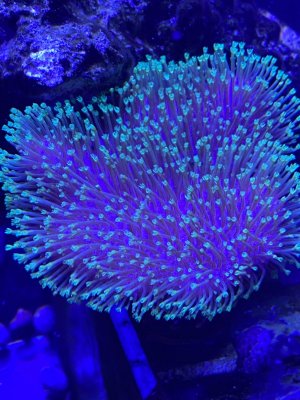Simple question, if a TDS meter is reading 0 on output source water , the membrane is 2.5 years old and the other filters are about 8-9 months old can harmful bacteria grow on those filters contaminating the water? Why should you change the filters even if tds is reading 0?
Navigation
Install the app
How to install the app on iOS
Follow along with the video below to see how to install our site as a web app on your home screen.
Note: This feature may not be available in some browsers.
More options
You are using an out of date browser. It may not display this or other websites correctly.
You should upgrade or use an alternative browser.
You should upgrade or use an alternative browser.
Let’s talk RODI
- Thread starter LEOreefer
- Start date
- Tagged users None
The prefilters protect the membrane from junk that might compromise it.
If you’re getting zero no need to change the di resin yet.
If you’re getting zero no need to change the di resin yet.
You can usually visually tell when your sediment and carbon filters need changing. No need to change DI if your tds is 0. However if you want to test your membrane you should read the tds of your source water then the tds of the water coming out of the membrane but before the DI cartridge. It should be removing 95% of the tds and sending that last 5% to the DI to clean out. If it’s not cleaning 95% you will just burn through DI resin faster and have to spend more money replacing it. It impacts your wallet not really your water quality as long as you keep the DI refilled. My RO membranes last 4-5 years.
- Joined
- Nov 12, 2018
- Messages
- 66
- Reaction score
- 49
Also, testing for chloramines/chlorine is a good idea because they can be present with 0 tds. If so change the carbon block
This might be a dumb question but how does one text for chloramines ?Also, testing for chloramines/chlorine is a good idea because they can be present with 0 tds. If so change the carbon block
- Joined
- Sep 28, 2019
- Messages
- 1,637
- Reaction score
- 1,090
I believe bacteria can still pass the membrane and di, that's why they sell UV kits. That's also 1 reason refrigerator filters need replaced every 3-4 months even without much use. I would reach out to spectrapure though and confirm.
I’m having an issue with my LPS and I’m thinking my filters are beyond exhausted and allowing chloramine into my system. I’m a successful reef keeper and through testing at home as well as ICP this is the only thing I can narrow it down to. My membranes as 2 plus years old , pre filters at least 8 months old. When you turn the hot water on in the shower you can smell the chlorine so I’m wondering if this could be my issueI believe bacteria can still pass the membrane and di, that's why they sell UV kits. That's also 1 reason refrigerator filters need replaced every 3-4 months even without much use. I would reach out to spectrapure though and confirm.
- Joined
- Sep 28, 2019
- Messages
- 1,637
- Reaction score
- 1,090
Chloramines require special carbon blocks to deal with. They need replaced more often or they will degrade the membrane. I don't have chlorine or chloramines but do have high co2 which requires me to degas my ro water before pushing it through the di. I'd shoot spectrapure an email or call them. They have been extremely helpful getting my needs sorted with hard well water and high co2 based on my water report.
- Joined
- Nov 12, 2018
- Messages
- 66
- Reaction score
- 49
They make test strips (which can be hit or miss with the cheap ones especially). The Hach CN-70 is one that Randy recommended in his article all about chloramines here: http://reefkeeping.com/issues/2003-11/rhf/feature/index.phpThis might be a dumb question but how does one text for chloramines ?
They also have Hannah checkers for it. Hannah sells a “free chlorine” checker and a “total chlorine”. The free chlorine is chlorine. The "total chlorine" one is chlorine/chloramines. So you could check your free chlorine level then your total and the difference number between the two is your chloramines level. Much easier and cheaper though to just look up your cities water report online to find out if they treat your water with chloramines or not and then just buy the total chlorine one to make sure it is reading 0 in your batches of RODI.
If you do find you have any then I would reccommend 2 carbon blocks or at very least 1 carbon block that is at least 1 micron. BRS for instance sells a 4 stage rodi unit but it comes with the 5 micron block. They do sell BRS brand 1 micron blocks for chlorine/chloramines. https://www.bulkreefsupply.com/brs-universal-carbon-block-filter-1-micron.html
You can spend a lot of money on items like the "Chloramine monster" and magical carbon blocks that are supposedly amazing for it but are expensive.. 1 or 2 blocks that are 1 micron from BRS are enough depending on how often you run the thing and how much you are making. BRS has some videos on their channel also that go in depth about chloramine removal.
Last edited:
After running the unit for 30 min check the waste water output (or sample from output of carbon blocks before membrane) with a total chlorine (or any dual free and total chlorine) test strip. I use LaMotte free and total and have a sample line between blocks and membrane.This might be a dumb question but how does one text for chloramines ?
I do have a 6 stage 150gpd RODI unit from BRS with carbon blocks that haven’t been change in 8-9 months which I’m now suspect to be the issue in my systemThey make test strips (which can be hit or miss with the cheap ones especially). The Hach CN-70 is one that Randy recommended in his article all about chloramines here: http://reefkeeping.com/issues/2003-11/rhf/feature/index.php
They also have Hannah checkers for it. Hannah sells a “free chlorine” checker and a “total chlorine”. The free chlorine is chlorine. The "total chlorine" one is chlorine/chloramines. So you could check your free chlorine level then your total and the difference number between the two is your chloramines level. Much easier and cheaper though to just look up your cities water report online to find out if they treat your water with chloramines or not and then just buy the total chlorine one to make sure it is reading 0 in your batches of RODI.
If you do find you have any then I would reccommend 2 carbon blocks or at very least 1 carbon block that is at least 1 micron. BRS for instance sells a 4 stage rodi unit but it comes with the 5 micron block. They do sell BRS brand 1 micron blocks for chlorine/chloramines. https://www.bulkreefsupply.com/brs-universal-carbon-block-filter-1-micron.html
You can spend a lot of money on items like the "Chloramine monster" and magical carbon blocks that are supposedly amazing for it but are expensive.. 1 or 2 blocks that are 1 micron from BRS are enough depending on how often you run the thing and how much you are making. BRS has some videos on their channel also that go in depth about chloramine removal.
Randy Holmes-Farley
Reef Chemist
View Badges
Staff member
Super Moderator
Excellence Award
Expert Contributor
Article Contributor
R2R Research
My Tank Thread
- Joined
- Sep 5, 2014
- Messages
- 67,085
- Reaction score
- 63,416
Simple question, if a TDS meter is reading 0 on output source water , the membrane is 2.5 years old and the other filters are about 8-9 months old can harmful bacteria grow on those filters contaminating the water? Why should you change the filters even if tds is reading 0?
Low flow from clogged sediment filter is one reason to change filters. I had that issue.
I do not think bacteria is any concern to a reef, but I wouldn’t drink the water unless youfrequently sanitize the system.
Randy Holmes-Farley
Reef Chemist
View Badges
Staff member
Super Moderator
Excellence Award
Expert Contributor
Article Contributor
R2R Research
My Tank Thread
- Joined
- Sep 5, 2014
- Messages
- 67,085
- Reaction score
- 63,416
Chloramines require special carbon blocks to deal with. They need replaced more often or they will degrade the membrane. I don't have chlorine or chloramines but do have high co2 which requires me to degas my ro water before pushing it through the di. I'd shoot spectrapure an email or call them. They have been extremely helpful getting my needs sorted with hard well water and high co2 based on my water report.
they do not require it, but if chloramine is getting through, they may be useful. I did not need special ones to remove chloramine, nor did most people that tested their water for my chloramine article.
Randy Holmes-Farley
Reef Chemist
View Badges
Staff member
Super Moderator
Excellence Award
Expert Contributor
Article Contributor
R2R Research
My Tank Thread
- Joined
- Sep 5, 2014
- Messages
- 67,085
- Reaction score
- 63,416
I’m having an issue with my LPS and I’m thinking my filters are beyond exhausted and allowing chloramine into my system. I’m a successful reef keeper and through testing at home as well as ICP this is the only thing I can narrow it down to. My membranes as 2 plus years old , pre filters at least 8 months old. When you turn the hot water on in the shower you can smell the chlorine so I’m wondering if this could be my issue
Sounds like an unlikely explanation to me, but it is easy enough to check.
- Joined
- Sep 28, 2019
- Messages
- 1,637
- Reaction score
- 1,090
I'm just going off what spectrapure told me. Chloramines will pass through the membrane if I remember correctly and need a 1 or .5 micron carbon block to effectively remove them, otherwise they end up in your product water as di does not remove it. But I'm not 100% positive on remembering correctly, that's why I recommended to reach out to spectrapure directly.they do not require it, but if chloramine is getting through, they may be useful. I did not need special ones to remove chloramine, nor did most people that tested their water for my chloramine article.
Randy Holmes-Farley
Reef Chemist
View Badges
Staff member
Super Moderator
Excellence Award
Expert Contributor
Article Contributor
R2R Research
My Tank Thread
- Joined
- Sep 5, 2014
- Messages
- 67,085
- Reaction score
- 63,416
I'm just going off what spectrapure told me. Chloramines will pass through the membrane if I remember correctly and need a 1 or .5 micron carbon block to effectively remove them, otherwise they end up in your product water as di does not remove it. But I'm not 100% positive on remembering correctly, that's why I recommended to reach out to spectrapure directly.
the carbon block is critical, but it need not be one sold as a special chloramine carbon block.
- Joined
- Sep 28, 2019
- Messages
- 1,637
- Reaction score
- 1,090
By special I meant fine micron vs say 5 micron that won't adsorb the chloramines or rather break their bond. Spectrapure says 1 micron or less and not a coconut based carbon, if I'm remembering correctly.
Randy Holmes-Farley
Reef Chemist
View Badges
Staff member
Super Moderator
Excellence Award
Expert Contributor
Article Contributor
R2R Research
My Tank Thread
- Joined
- Sep 5, 2014
- Messages
- 67,085
- Reaction score
- 63,416
I discuss how to/di removes chloramine here, along with data on its removal by ordinary reefers:
This is my theory:the carbon block is critical, but it need not be one sold as a special chloramine carbon block.
Alk. 8.2
Calcium: 400
Mag: 1420
Phos: .15
Nitrate: 2
Salt 1.026
ICP test indicators all within normal limits with the exception of Iodine ( it was high but I resolved through water changes)
Weekly water changes of 5 gallons
My duncan coral is closed , Ginopora retracted, birds nest browned out showing signs of RTN
My neon green leather coral looks extremely good.
Ive had tons of success in this hobby and am pretty knowledgeable on basic reefing practices.
My theory is since my BRS dual carbon blocks havnt been changed in 8 or so months that im letting chloramines into my system.
Pics will be below
Similar threads
- Replies
- 11
- Views
- 157
New Posts
-
-
-
Liquid limestone: Have you used a Kalkwasser Reactor?
- Latest: twentyleagues










